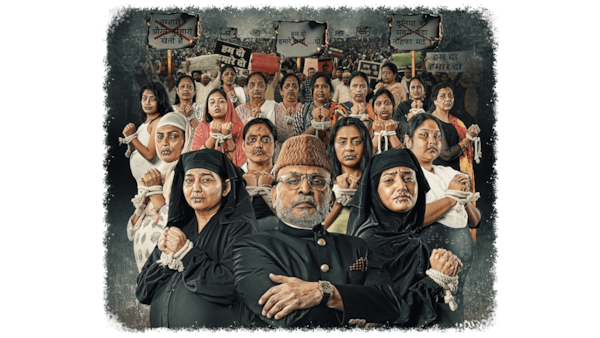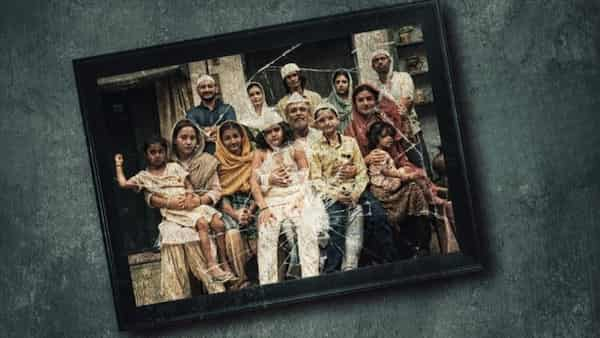Hamare Baarah Is A Disservice To Both Muslims And Women
This is #CriticalMargin, where Ishita Sengupta gets contemplative over new Hindi films and shows

Last Updated: 03.09 PM, Jun 24, 2024
FOR a film based on a Muslim family and so suffused with the language, music and people from the community, Hamare Baarah has not one Muslim person in the direction or writing team. It is not an accidental but deliberate exclusion that speaks volumes about the film’s intent and empathy, both of which prove to be a sham during its runtime. Directed by Kamal Chandra, the film’s release was held up for two weeks on the apprehension that the film might be Islamphobhic; it was later cleared by the Bombay High Court, insisting that it aimed at the upliftment of women. This is an observation that holds little merit. Hamare Baarah cares about its female characters as much as former US President Donald Trump believes in climate change (he terms it a hoax).
Set in Lucknow, the story revolves around Manzoor Ali Khan Sanjari (Annu Kapoor), a 60-year-old ultra-conservative Muslim man who earns his living by singing qawwali — devotional songs performed at dargahs. He is married to Rukshaar (Ankita Dwivedi), his second wife, who is decades younger than him. He has 11 kids from both his marriages and everyone is terrified of him. They are not allowed to go to school or pursue a career. Sanjari believes in the virility of manhood and procreating as a means of proving it. His teenage daughters have varied interests: one writes secretly while another is fond of singing, but none has the courage to tell their father. Things start unraveling when Rukshaar gets pregnant again and the doctor warns that it can be a health hazard. One of his daughters, Alfiya goes forth and registers a case against Sanjari and fights for her step-mother’s abortion. So far so feminist.

To be clear, Chandra’s outing, released with some deleted “objectionable” scenes and few muted lines, is neither pro-women nor pro-minorities. It is as propagandist as most Hindi films in the last couple years have been. The underlying idea is doubling down on Muslims even when the narrative is wrapped as a social message. In this case, that message is women being given agency and choice over their bodies and a say on the number of children they want to have. But this is just in theory. Hamare Baarah dangles women’s empowerment as a destination and uses the journey to willingly drag an entire community through the mud and subject them to taunts. Later, it feebly tries to offset the crudity by including scenes where the blame of Muslim men’s drive to have more children is placed on maulvis, the religious scholars of Islam.
The dishonesty is startling since the premise and supposedly complex court case (which gets resolved in all of three sittings), are used as means to not fight for upliftment for women but to reiterate prejudices associated with a community. The idea of Muslims procreating uncontrollably aligns with a Hindutva straw man argument commonly dubbed as “population jihad”. Chandra’s film plays on this communal stereotype, completely disregarding facts that in the last couple of years, the growth rate of Indian Muslims has declined sharply and their fertility rate has fallen more than the Hindu fertility rate.

Hamare Baarah goes nowhere near statistics. The reasoning, though implied, is this: the film is about an extremist Muslim man, there are lawyers in the case (Ashwini Kalsekar and Manoj Joshi), both Muslims who do not harbour such beliefs. The reasoning here is this: the protagonist is an anomaly, not a norm, and the focus should be on the women being denied their rights and not the man hell bent on proving his virility. The reasoning in Hamare Baarah is this: Indian Muslims are the stumbling blocks in India’s path to development. Everything else in the film is a farce.
Midway, even that pretence drops. The loud, tackily shot courtroom sequences, where witnesses and evidence magically pop up, are suddenly hijacked by conversations about triple talaq and the need to curb population control. It takes a while but the message finally takes shape. Hamare Baarah spends 148 minutes endorsing the implementation of the Population Control Bill, a 2019 proposal built on the right-wing idea that Indian Muslims will outnumber Hindus. On cue, we have scenes like Sanjari giving interviews about his right to have as many children as he wants and others watching that and commenting, “Because of people like Khan, we have left China behind in population” or, “Because of Khan we will soon resemble the neighbouring country”. These culminate in a shamelessly brazen moment when a supposed politician says that Indian Muslims are responsible for not passing the bill. So far so propaganda.
If Hamare Baarah contends that it knows what Muslims want better than they do, then it makes an equal claim about women. In the outing, female characters are given no ounce of agency (the lawyer takes her husband back with just one ‘sorry’ after he has repeatedly shown himself to be unsupportive) or strength. Instead, they are used as pawns and sacrificial lambs to drive a pro-government message home. The film concludes with people holding placards that state “Hum Do Hamare Do”. In case you were not looking, Hamare Baarah makes it amply clear in this moment that it might be sermonising about women and their autonomy over their bodies, but how many children they can — and should — have is someone else’s decision. So much for female empowerment.
The views expressed in this column are those of the author and do not necessarily reflect the official policy or position of OTTplay. The author is solely responsible for any claims arising out of the content of this column.

 Premium
Premium